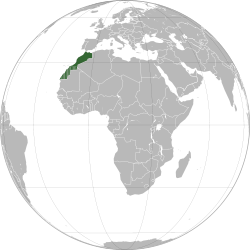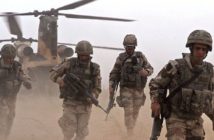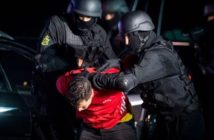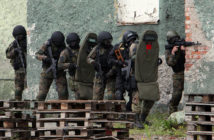By: Said Temsamani
 Last week Moroccans authorities thwarted an attempt by a terror cell to carry out attacks on strategic sites in the kingdom. The Interior Ministry said that eight members of the Ansar Al-Al Sharia were arrested. Members of the cell are suspected of trying to contact with members of the Al-Qaeda international terrorist network in northern Africa.
Last week Moroccans authorities thwarted an attempt by a terror cell to carry out attacks on strategic sites in the kingdom. The Interior Ministry said that eight members of the Ansar Al-Al Sharia were arrested. Members of the cell are suspected of trying to contact with members of the Al-Qaeda international terrorist network in northern Africa.
A few days ago, the foiling of a similar plot was announced. Morocco witnessed serious terrorist attacks in Casablanca and Marrakesh and since then the Moroccan authorities have intensified their vigilance to foil any dormant cell in the country.
Morocco
I know that such terror can be explained sociologically, but what shocks many Moroccans, particularly those of my generation, is that such religious ferocity simply didn’t exist in our youth. We thought that the austere and puritanical temperament of other Muslims wasn’t suitable for a country where Islam is heavily influenced by the Sufi tradition.
We are a country of zawyas. When I used to meet someone in Rabat or Fez, I would be greeted as the son of Sidi Bou’araqiya, the “patron saint” of Tangier. The same goes for other cities and villages. Each one has its own “saint,” and such awliya, like all saints, have their own specialties. Some specialize in infertility problems, others in certain illnesses, and still others in just general good luck.
I grew up in a world populated by hmadcha, derqawa, issawa, gnawa, and, as a kid, witnessed a hadra ceremony in a modern apartment building in Tangier. Moroccans believe in the baraka of awliya and shurfa, considered bid’a, or heresy, by strict literalists. Muslim Morocco was always different: the kingdom was established by a man, Moulay Idriss, who fled the East and the murderous designs of the Abbasid caliph, Haroun Errachid, and was proclaimed king by the Amazigh tribal leaders at Walili. Yet, the caliph’s henchman, Eshemmakh, reached our king and poisoned him, leaving his wife pregnant with child.
This may well have been the first major terrorist attack on our Muslim nation. But Moroccans persevered and fought jealously to guard their independence. We never surrendered to the Ottomans and fought them as much as we did the Spaniards. Morocco has always had its own culture, its own style and mind.
We are shocked by what is happening in Morocco because we simply feel that this new religious militancy is foreign to our souls. Perhaps it was a long time in the making without people realizing it. The 20th century, with its mass media technologies, has reconnected Morocco with the East in ways that are good and bad, but it is the bad that seems to be gaining the upper hand. Moroccans seem to be slowly blending into a nondescript Arab or Muslim whole, and forgetting what makes them uniquely Moroccan.
In the Tangier of my youth, mosques, cafés and bars coexisted without anyone erupting into moralistic crusades or disrespectful behavior. Those who drank used to pause in respect of the mueddin; and those who smoked hid their cigarettes to kiss the hands of the neighborhood fquih. Perhaps because the intonation of our prayers and the Qur’anic recitations with that typical Moroccan voice–so soft and spiritual–blanketed mercy over the city and nation.
It’s funny, but my friends have always taken issue with me for not being crazy about the legendary mujawwid Abdel Basit Abdel Samad: the only voice that penetrates deep into my soul and soothes me is Abdelrahman Ben Moussa’s, may he rest forever in peace. This is what I mean when I talk about a Moroccan soul: it has a voice, a cadence, a style, an expression that one cannot find, say, in Iraq. Every time I listen to Ben Moussa (and I wish his reading of the entire Qur’an were available, just like Abdel Basit’s is), I am invaded by a serene feeling of peace and a powerful sense of poetic—no, divine—justice. Life is passing, Ben Moussa’s fragile voice seems to convey again and again. It inspires one to seek mercy, not retaliation against an enigmatic cosmic order.
This is also why I think that the young men who detonated themselves in Casablanca to kill people seem so foreign to me. They are not part of our memory. They must have been listening to other voices, shaped by other experiences and histories. Because they were lost souls and hadn’t taken the time to discover their own national traditions, they fell prey to false sermons and struck with nihilistic power at their mothers, brothers, and sisters.
But Morocco is not an ancient civilization for nothing: it has survived worse episodes of aggression and withstood a million designs on its freedom. The tragic events in Casablanca and Marrakesh only strengthened Morocco’s tradition of tolerance, as Moroccans begin to realize what they might lose if they let satanic forces define their future for them.
My feeling is that our country, with its deeply entrenched spiritual heritage, will always emerge stronger than ever in facing and putting an end to those fundamendalists who menace values that Moroccans worship and those are: coexistence, tolerance and respect to other religions.
About the author:
Said Temsamani
Said Temsamani is a Moroccan political observer and consultant, who follows events in his country and across North Africa. He is a Senior Fellow, Merdian International Center Washington DC, Founder and CEO “Public Initiatives” Consulting firm and Former Senior Political Advisor, US Embassy Rabat, Morocco.
.






